Common menu bar links
Breadcrumb Trail
ARCHIVED - Career Development in the Federal Public Service - Building a World-Class Workforce
 This page has been archived.
This page has been archived.
Archived Content
Information identified as archived on the Web is for reference, research or recordkeeping purposes. It has not been altered or updated after the date of archiving. Web pages that are archived on the Web are not subject to the Government of Canada Web Standards. As per the Communications Policy of the Government of Canada, you can request alternate formats on the "Contact Us" page.
Chapter 2 - Career Development in the Federal Public Service: The Interview Study (Continued)
3. Career Goals and Aspirations
To assess career goals and aspirations respondents were asked:
- Where do you see your career in the next five years?
- Where do you see your career ultimately?
The results for each of these questions are presented below.
Where do you see your career in the next five years?
Respondents answered this question in two quite different ways (see Table 2.12). One set of respondents talked about what position they aspired to hold in the next five years (ADM, DM, other management position) while others talked about what they hoped to get from their career (satisfaction, self-esteem, influence, the chance to make a contribution). Fourteen percent of the sample indicated that they were already where they wanted to be with respect to their career. Eleven percent of the sample hoped to hold a position outside the government within the next five years. The following quote typifies this response.
"Outside of government. I have a lot of interests outside of government. I'm the kind of person who needs at the end of the day to see goals met. I get a lot of pleasure out of seeing things completed. And in government, that's the kiss of death."
|
Where do you see your career in the next 5 years? |
Percent |
|---|---|
|
* Multiple responses recorded |
|
|
Management position within government |
29% |
|
Working in an another area of the government (e.g., policy, federal-provincial relations, operations, more "people related", more technical, another department of interest, etc.) |
27% |
|
Describes goals in intrinsic terms (a job that yields satisfaction, self-esteem, personal sense of accomplishment, enhances my skills, lets me learn) |
20% |
|
Describes goals in terms of progress (succession up the ranks, some job that "builds" on this one, a clear step up) |
18% |
|
I'm already where I want to be ("I'm there"), same position |
14% |
|
Position outside of government (private sector, quasi-public, consulting, etc.; job that pays better, yields more recognition) |
11% |
|
Describes goals in terms of influence/contribution (something where I can make a difference, relevant, a contribution) |
11% |
|
DM or ADM |
10% |
Gender
There is only one gender difference in these data. Women were more likely to describe their five-year career goals in intrinsic terms (27% versus 13%). This finding is consistent with the data on career success presented earlier (women were more likely to define career success in terms of self-esteem).
Job Type
Five-year career aspirations vary with job type as follows:
-
executives were more likely than other respondents to describe their five-year career goals in terms of influence and contribution (24% of executives gave this response). They were also more likely to aspire to the position of ADM or DM;
-
officers were more likely than other respondents to describe their five-year career goals in terms of progress (30% of officers gave this response);
-
analysts were less likely than other respondents to feel that they were already where they wanted to be with respect to their career goals (only 1% of analysts gave this response); and
-
scientists were more likely to feel that they were already where they wanted to be with respect to their career goals (28% of scientists gave this response). They were also more likely to describe their career aspirations in intrinsic terms (33% of scientists gave this response).
Participation in CDP
Five-year career aspirations vary with CDP participation as follows:
-
respondents who were not in a CDP were more likely to report that they were "already where they wanted to be" with respect to their career (21% of non CDP participants gave this response versus 6% of those in a CDP);
-
CDP participants were more likely to say that they aspired to be a DM or ADM within the next five years (22% of CDP participants gave this response versus 4% of non CDP participants). They were also more likely to hope that within five years they would be in a position of influence/contribution (21% of CDP participants gave this response versus 5% of non CDP participants);
-
70% of AEXDP hoped to be a DM or ADM in the next five years. None of the respondents in this group indicated they were already where they wanted to be;
-
25% of those in the ADM pool hoped to be a DM in the next five years. Respondents in this group were also more likely than others to describe their goals in intrinsic terms (33% of ADM pool gave this response);
-
two-thirds of respondents in the CAP sample and half of the respondents in the MTP sample hoped that within five years they would be in a management position within the government;
-
one-quarter of those in the CAP program hoped that within five years they would be in a position of influence ("somewhere where I can make a difference");
-
one-third of those in the MTP program described their five-year career goals in intrinsic terms (a job that yields satisfaction and esteem); and
-
none of the respondents in the CAP or MTP samples aspired to be an ADM or DM within the next five years.
Where do you see your career ultimately?
Approximately 20% of respondents stated that their ultimate career goal was to:
- become an ADM or DM (21%);
- "hold a job that is satisfying and enhances my self esteem" (i.e. same as describing goals in intrinsic terms in Table 2.11) (21%);
- hold some other management position within the government (18%);
- work in another area of government (18%); or
- work in some position outside the government that pays more and offers greater recognition (18%).
Eleven percent of the sample indicated that whatever happened, they did not want to become a DM ("I don't need the stress", "I don't want the responsibility and long hours", "I have a life".)
Gender
Women were significantly more likely than men to see themselves working in a position outside the government (22% of women gave this response versus 12% of men).
Job Type
Again, career aspirations are strongly associated with job type. Not surprisingly, executives were more likely than employees in other groups to aspire to the position of DM or ADM (31%). Respondents in this group were also more likely than respondents in the other three job categories:
-
to think that ultimately they would be working outside the government (30% gave this response); and
-
to indicate that they did not want to be a DM! (25% gave this response).
Scientists were also more likely to indicate that they did not want to be a DM (21% of the respondents in this group gave this response). Respondents who worked as analysts were more likely than other employees to express their ultimate career goals in intrinsic terms (30%).
Participation in CDP
Ultimate career aspirations also varied with CDP participation. Respondents who are in CDPs were more likely than those who are not in a CDP to say that they ultimately aspire to be a DM or ADM (30% versus 15% ). Respondents who are not in CDP were more likely than their counterparts who are in CDPs to say "they already are where they want to be" (18% versus 1%). These results would suggest that employees who participate in CDP have higher career aspirations than those who do not. These findings can be interpreted in two ways: (1) those who have higher career aspirations are more likely to self-identify for these programs, or (2) CDPs lead to higher career aspirations.
Within the specific programs, the following between-group differences are worthy of note:
-
AEXDP had high career aspirations, with half of the respondents in this group indicating that ultimately they hoped to be a DM or ADM.
-
Almost 20% of those in the ADM pool think that ultimately they will become a DM. A greater number, however, (25%) indicated that they didn't ever want to become a DM! Forty percent of the respondents in this group felt that ultimately they would hold a position outside the government that offers more recognition.
-
While none of the MTPs aspired to become an ADM or DM within the next five years, 30% of them felt that this is the position that they would end up in ultimately. Respondents in this group were also more likely to describe their ultimate goals in intrinsic terms (33%).
-
Those in the CAP program have more modest aspirations. Just over one-third of the respondents in the CAP sample felt that ultimately they would be in a management position within the government; another 33% saw themselves working in another area of the government. Only 7% felt that ultimately they would become ADMs or DMs.
Where do you see your career ultimately?
|
4. Promotability
During the interview we asked respondents the following questions related to promotions:
-
Have you ever received a promotion? If yes, why do you think you received this promotion?
-
Have you ever been passed over for a promotion/ competed and didn't get a promotion? If yes, why do you think you were passed over?
Responses to these questions are summarized below.
Have you ever received a promotion?
Almost all of those in the interview sample (93%) indicated that they had received a promotion during the course of their Public Service career. There were no gender, job type or CDP differences in these findings. These data, which are virtually identical to those compiled from the FAX-back survey, suggest that the individuals who participated in the interview phase of the research have had a number of career successes. As such, the strategies they have used to manage their careers are of interest to those aspiring to advance in the Public Service.
Why do you think you received this promotion?
Respondents typically credited their promotion to their experience and background (I got it because I was the most "qualified") (55% of sample) and their performance history ("I produce"; "I had already demonstrated I could do the type of things they were looking for") (45% of the sample). Twenty percent of the sample said that their personal qualities (creativity, loyalty, leadership, personality, the "right stuff") had lead to their promotion. Only 11% attributed their promotion to hard work.
Gender
Men were more likely to say they received their promotions because of their experience/background (58% versus 46%). Women were more likely to say they received their promotions because of their personal qualities (24% versus 14%).
Job Type
Executives were more likely to say they were promoted on the basis of their experience (66% gave this response), their performance history (58% gave this response) and their personal qualities (32% gave this response). Twelve percent of executives indicated that they were promoted "because there was a good fit between them and the people doing the selection." Only 2% of respondents in the rest of the sample gave this response.
Analysts, on the other hand, were more likely to think that they were promoted because it was "automatic" (it comes with the program I'm in) (20% of analysts gave this response versus 2% of in the rest of the sample).
Scientists had a very different view of why they were promoted than did respondents in other job groupings. They were less likely to think they were promoted based on experience (only 28% of scientists gave this response), their performance history (only 30% of scientists gave this response) or their personal qualities (only 5% of scientists gave this response). Instead, they attributed their promotions to the fact that they had met/completed some formal requirement such as training or education (20% of scientists gave this response) or because they had a good interview or were good at the competition process (17% of scientists gave this response).
Participation in CDP
Non CDPs were more likely to think they had been promoted because they had met some formal requirement (15% of people who did not participate in CDPs gave this response versus 0% of respondents who were in CDPs). Respondents in CDPs, on the other hand, were more likely to think they had been promoted on the basis of performance history (51% versus 37%) and their personal qualities (25% versus 14%).
There were also a number of between-group differences in responses within the CDP sample:
-
AEXDP were more likely to think they were promoted on the basis of performance history (55%) and personal qualities (40%);
-
those in the ADM pool were more likely to think they were promoted because of their experience/background (72%), because they had a good interview (12% of the ADM pool sample gave this response versus 0% in all other groups!) and because they were good at the competition process (16% of the ADM pool sample gave this response versus 1% in all other groups!);
-
CAP were more likely to think they had been promoted because of their experience (70%), and their formal training (12% of the CAP sample gave this response versus 1% in all other groups). They were less likely to think they had been promoted due to their performance history (only 19% of respondents in the CAP sample gave this response); and
-
MTP were more likely to think they had been promoted because it was automatic (47% of the MTP sample gave this response versus 0% in all other groups!).
Why do you think you received your promotion?
|
Have you ever been passed over for a promotion - competed for and didn't get a promotion? Why do you think you were passed over?
Two-thirds of the sample were able to recall an occasion when they had been passed over for a promotion. Responses given as to "why they were passed over" are given in table 2.13. A plurality of respondents (42%) cited lack of experience as the primary reason. Approximately 40% of respondents felt that some aspect of the competition process had contributed to their lack of success (e.g., poor "fit" with those doing selection; bad interview/bad at competitive process; the competition was a formality - the job was already filled). Respondents also blamed their inability to get promoted on equity/diversity issues (too old, job went to a woman, job went to a man, job went to a minority group, etc.)
|
Why Not Promoted (Employees' View) |
Total |
|---|---|
|
* Multiple responses recorded |
|
|
Not enough experience, not "qualified", someone else better qualified |
42% |
|
Poor "fit" with those doing selection (different values, goals) |
16% |
|
Someone else had been "groomed" for it, was acting in the capacity in preparation for the job, it had already been filled, competition was a formality |
15% |
|
Equity/diversity issue (old boys' club, job went to a woman, minority, etc.) |
14% |
|
My personal qualities (wanted stronger personality, etc.) |
11% |
|
Bad interview/bad at competitive process |
10% |
Gender
Men were more likely to have been passed over for a promotion than women (71% versus 60%) and to think they did not get promoted because they did not have enough experience/were not qualified (47% versus 30%). Women were more likely to think that they did not get promoted because of personal characteristics (17% versus 7%).
Job Type
Respondents from each of the five job types examined in this research were equally likely to have been passed over for a promotion. The reasons respondents gave for being passed over for a promotion were not associated with job type.
Participation in CDP
The likelihood of being passed over for a promotion and the reasons given for being passed over are not linked to participation in a CDP. There is, however, variation within program type. Three quarters of those in the AEXDP, ADM pool and CAP programs have been passed over for a promotion versus 43% of MTPs. Reasons given vary by program as follows:
-
AEXDP were more likely to feel they had not been promoted because they were a poor fit with those doing the interview (27%) and less likely to feel that they had not been promoted due to a lack of qualifications or experience (27%);
-
those in the ADM pool were more likely to think they had not been promoted because they did not have the necessary experience and qualifications (60%);
-
CAP were more likely to think they had not been promoted because they were not qualified for the job (43%) and because of diversity/equity issues (25%). None of those in the CAP sample felt that they had not been promoted because of their personal qualities;
-
MTP were more likely to think they had not been promoted due to their lack of experience (53%). None of those in the MTP group attributed their lack of success to a bad interview.
Why do you think you were passed over for your promotion?
|
5. Personal Career Strategies
A key feature of new career management concepts is that the organization and the employee are partners in career development. Employees are responsible for knowing what their skills and capabilities are, what assistance they need from their employers, asking for that assistance and preparing themselves to assume new responsibilities. The following questions were included in the interview to determine what individuals were doing to forward their own careers and to discover what impact they perceived their personal situation had on their career development:
-
What kinds of things have you done in the past 3 years to increase the chances you'll achieve your career goals?
-
Have you ever tried a strategy that backfired (i.e., didn't work)? Why do you think it didn't work?
-
Can you think of anything in your personal life that has had:
- a POSITIVE effect on your ability to meet your goals?
- a NEGATIVE effect on your ability to meet your goals?
Responses to each of these questions are presented and discussed below.
What have respondents done in the past 3 years to increase the chances they will achieve their career goals?
Only 4% of the interview sample said that they had done "nothing" personally to move their careers forward. The data (see Table 2.14) indicate that the most common personal career development strategy by far was to increase one's breadth of knowledge (i.e. respondents noted that they applied for or made lateral moves, moved to international, interprovincial work, moved to a different department, broadened their expertise, broadened their exposure). This strategy was practiced by 62% of respondents. Other common personal career development strategies mentioned by the sample include:
-
training (language, budget, finance, HR) cited by 36% of the sample);
-
joining a specific development program such as AEXDP, CAP, MTP, (cited by 28% of the sample);
-
increasing one's visibility (e.g. respondents indicated that they applied for or moved to a job that put them in touch with people in high places; increased their committee work; "hitched themselves to a star"; took tough jobs that put them "on the radar screen") (cited by 21% of the sample);
-
scanning the horizon and learning about "politics", corporate objectives, trends and issues (i.e. respondents took sensitive jobs, put themselves in touch with department's/country's direction) (cited by 16% of the sample); and
-
networking and finding a mentor (cited by 16% of the sample).
Eleven percent of the sample said they had increased their formal education (completed a new degree); 10% said that they had looked at their own values, strengths, goals etc (i.e. used introspection as a strategy). Only 6% of respondents indicated that they "worked hard"; only 4% said they "took risks."
|
Personal Career Strategies |
Total |
|---|---|
|
* Multiple responses recorded |
|
|
Increased my breadth |
62% |
|
Trained (language, budget, finance, HR) |
36% |
|
Joined a specific development program |
28% |
|
Increased my visibility, took tough jobs that "put me on the radar screen", etc.) |
21% |
|
Networked, found a mentor |
16% |
|
Scanned the horizon and learned about "politics" |
16% |
|
Formal education (completed a new degree, etc.) |
11% |
|
Introspection |
10% |
Gender
Men and women practiced similar personal career strategies.
Job Type
With the exception of respondents in the managerial and analyst groups (whose responses were identical to those reported for the total sample), personal career strategies varied considerably by job type:
-
executives were more likely to have scanned the horizon (cited by 27% of this group) and less likely to have trained (cited by 15% of this group) or increased their formal education (cited by 2% of this group);
-
officers were more likely to have trained (cited by 68% of this group) and increased their visibility (cited by 31% of this group) and less likely to have increased their breadth (cited by 50% of this group); and
-
scientists were more likely to have trained (cited by 50% of this group) and less likely to have scanned the horizon (cited by 0% of this group) or joined a specific development program (cited by 10% of this group).
Participation in CDP
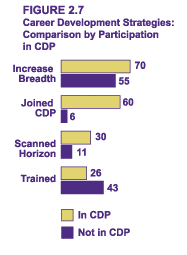 As
can be seen in Figure 2.7, the personal career development strategies used by
respondents in CDPs were different from those used by non-program respondents.
There was also a considerable amount of variation in strategies followed by
respondents in the different CDPs:
As
can be seen in Figure 2.7, the personal career development strategies used by
respondents in CDPs were different from those used by non-program respondents.
There was also a considerable amount of variation in strategies followed by
respondents in the different CDPs:
-
AEXDP were more likely to have increased their breadth (72%), increased their visibility (33%), found a mentor (33%) and engaged in introspection (20%). They were less likely to have trained (14%);
-
those in the ADM pool were more likely to have scanned the horizon (36%) and less likely to have taken training (12%);
-
CAP were more likely to have increased the amount of formal education they had (28%) and less likely to have scanned the horizon (8%) or found a mentor (4%); and
-
MTP were less likely to have networked (4%) or increased their visibility (4%).
Ever tried a career strategy that backfired (i.e., didn't work)? Why didn't it work?
Half the sample said that they had never had the experience of a career strategy backfiring! Twenty percent said that they had taken a job that hadn't worked for them (I didn't like it; I wasn't interested in the work). Eighteen percent said that they had stayed too long in one position, assuming hard work was enough. In other words, they had not been proactive with respect to managing their career.
Respondents were not really able to articulate why their strategy had failed. The most common reasons given included:
-
the position/strategy was just not right for me - It didn't work out (cited by 25% the sample); and
-
you have to take your career in your own hands or it won't happen (cited by 25% the sample).
There were very few between group differences in these findings. Those worthy of note are listed below:
-
officers and analysts were more likely to say that they had taken a position/strategy that was just not right for them (72% of officers and 65% of analysts gave this response); and
-
CAP were more likely to say they had stayed too long in one position (33% gave this response).
What have you done in the past 3 years to increase the chances you'll achieve your career goals?
|
Have you ever tried a career strategy that "backfired"?
|
Has anything in your personal life had a POSITIVE effect on your ability to meet your goals? A NEGATIVE effect?
Positive
Only 7% of the sample could not think of anything in their personal lives that had had a positive effect on their ability to meet their career goals. The most common response by far, cited by 82% of the sample, was "support from spouse and family has had a positive effect on my ability to meet my career goals." Sixteen percent noted personal attributes that they felt had helped their ability to meet their career goals (I'm not a quitter, I have a strong work ethic, I'm patient, "Type A", etc.). Nine percent of respondents mentioned their formal education.
Negative
One third of the sample said that they could not think of anything in their personal life that had had a negative impact on their ability to meet their career goals. Twenty percent of the sample said that their children had made it more difficult for them to achieve their career goals (I can't relocate, I worry about them at work, I find it hard to stay late, come in early, etc.). Thirteen percent of the sample identified each of the following personal barriers to career development: (1) I am so busy I have no leisure time, no time to recharge, (2) personal/demographic attributes make it hard for me to meet my goals (e.g. too old, visible minority, unilingual), and (3) I am unwilling to relocate because of my family.
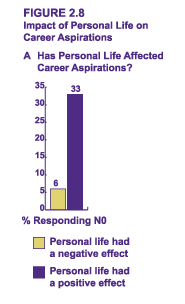
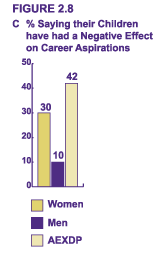
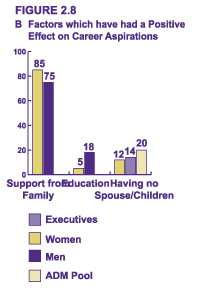
Key between-group differences in these responses are illustrated in Figure 2.8. These data indicate that many respondents (especially female respondents and those with heavier work demands) feel that children make it harder for employed parents to achieve their career goals. Conversely, not having children is seen by some as an effective career strategy. These data are consistent with the demographic data presented earlier.
It is interesting to note that almost one-quarter of the men who were interviewed felt that "the fact that they were male had hurt their ability to advance." This suggests that there may be some backlash to government policies with respect to employment equity and diversity.
Is there anything in your personal life that has affected your ability to reach your career goals?
|
6. Organizational Career Development Strategies
Although primary and final responsibility for career development rests with each employee, the organization has complementary responsibilities. The current human resources approach to career management can be summed up as follows: assign employees the responsibility for managing their careers and then provide the support they need to do it. This support can take many forms. In this research we look at support from three sources: the employee's immediate manager, the department in which the employee is employed, and the Public Service itself. The following questions were asked during the interview to determine organizational support for employee career development from each of these sources:
- What types of things does your supervisor do:
- to increase the chances you'll achieve your career goals?
- that make it harder for you to achieve your career goals?
- What types of things does your department do:
- to increase the chances you'll achieve your career goals?
- that make it harder for you to achieve your career goals?
- What types of things does the Public Service do:
- to increase the chances you'll achieve your career goals?
- that make it harder for you to achieve your career goals?
Responses to each of these questions are given below.
What types of things does your supervisor do:
- to increase the chances you'll achieve your career goals?
- that make it harder for you to achieve your career goals?
Support
Almost 20% of the sample said that their supervisor did "nothing" to help their career development. Other responses are given in Table 2.15. There is a high degree of overlap between the data in Table 2.15 (career support from managers) and the data in Table 2.14 (employee's personal career strategies). This high degree of correspondence suggests that employees appreciate a manager who helps them achieve their personal career goals (i.e. helps subordinates increase their breadth of knowledge and visibility, mentors their employees).
Further examination of the data in Table 2.15 identifies several attributes shared by managers who are seen as facilitating the career goals of their employees. According to the data, such managers are good communicators who are sincerely interested in helping subordinates reach their career goals (good listening skills appear to be particularly critical). They also appear to be very good at providing employees with the information they need to develop their careers (i.e. give good feedback, keep employees posted on trends, activities and opportunities). These findings correspond to research in this area which suggests the most important contribution managers can make to the career development of their subordinates is to provide them complete information and honest feedback about their job performance. The data also indicate that employees appreciate a manager who gives them autonomy ("gives me directions and then trusts me to do a good job").
|
How SUPERVISOR helps employee achieve career goals |
Total |
Men |
Women |
|---|---|---|---|
|
* Multiple responses recorded |
|||
|
Good people skills, sincerely supportive of me and my interests, good listener, sounding board |
39% |
33% |
47% |
|
Increases my exposure, breadth (encourages training, learning opportunities, program participation, contact with outside agencies or departments) |
34% |
31% |
35% |
|
Good communicator, provides important information, good feedback, keeps me posted on trends, activities and opportunities |
24% |
27% |
23% |
|
Gives me autonomy |
24% |
30% |
19% |
|
Overtly focuses on my career development/mentors me/role model for me |
22% |
20% |
24% |
|
Nothing |
17% |
18% |
17% |
|
Increases my visibility (supervisor is "upwardly mobile", introduces me to senior people, credits me with work, brags about me, invites me to meetings, committees, allows me to "speak" for him or her) |
13% |
11% |
14% |
|
Shares similar values, good personality, respect him/her, good match |
11% |
9% |
12% |
Hinder
Employees were also asked to identify things that their supervisor had done to make it harder for them to realize their career goals. Fully half of the sample could not think of anything that their supervisor had done to impede their career development! Ten percent of respondents said that their supervisor had made it harder by "doing little/nothing to enhance my breadth of knowledge" (they don't support training, don't let me take advantages of new opportunities, etc.). Fifteen percent said their manager was "too busy him/herself to spend time on my needs".
There are a number of very interesting between-group differences in these responses.
Gender
Women were more likely than men to say that their manager had helped by having good people skills (47% of women gave this response versus 33% of men). Men, on the other hand, were more likely to say their manager had helped by giving them autonomy (30% of men gave this response versus 19% of women). There were no gender differences with respect to behaviours which had made it harder.
Job Type
The kinds of things supervisors do to support the career development of their subordinates differs depending on what types of job their subordinates hold (see Box 2.4). Executives were more likely than employees in other groups to say their supervisor had helped by giving them autonomy. Analysts were more likely to say their manager had helped by mentoring them, while scientists were more likely to feel that their manager had helped by increasing their breadth.
Scientists held the most negative views on this issue. They were less likely than employees in other groups to feel that their managers had mentored them or increased their visibility, but more likely to say that their managers had made it harder for them to progress in their career by being too busy to spend time on their career needs (22% of scientists say this) and by "not being knowledgeable" about what the scientist did (28% of scientists say this versus 4% of the rest of the sample!)
|
* Responses cited by more than 20% of the sample |
|
|
Executive |
Good people skills (57%), gives autonomy (32%), good communicator (25%), |
|---|---|
|
Manager |
Good people skills(40%), increases exposure (32%), good communicator (29%), gives autonomy (23%) |
|
Officer |
Increases exposure (31%), good people skills (35%) gives autonomy (30%), good communicator (26%) |
|
Analyst |
Increases exposure (44%), good people skills (37%), mentors (34%), gives autonomy (25%) |
|
Scientist |
Increases breadth (47%), good people skills (29%), good communicator (24%), gives autonomy (24%) |
Participation in CDP
The data indicate that the kinds of things supervisors do to support the career development of their subordinates depend on whether or not the employee is part of a CDP (see Box 2.5). Respondents who participate in a CDP were more likely than those not in such a program to say their supervisor had helped by:
- having good people skills - being supportive;
- overtly focusing on their career/mentoring them; or
-
increasing their visibility.
|
* Responses cited by more than 20% of the sample |
|
|
Not in CDP |
Good people skills (37%), increases my breadth (33%), good communicator (25%), gives autonomy (22%) |
|---|---|
|
AEXDP |
Good people skills (57%), good communicator (33%), mentoring (33%), increases my visibility (33%), increases my breadth (24%), gives me autonomy (20%) |
|
ADM Pool |
Good people skills (40%), gives autonomy (40%), mentoring (33%), nothing (28%), good communicator (20%) |
|
CAP |
Good people skills (50%), increases exposure (31%), good communicator (27%), |
|
MTP |
Increases exposure (35%), good people skills (41%), mentors (38%), gives autonomy 31%) |
Is there anything your supervisor does that affects your ability to reach your career goals?
|
There was no corresponding difference in the other direction (i.e. no instance in which people who were not in CDPs felt that their managers were more supportive than those in a CDP).
It is also interesting to note that respondents in the ADM pool and in the CAP program were more likely to say that their supervisor had done nothing to help them meet their career goals (28% of those in the ADM pool and in CAP gave this response). Respondents in the AEXDP and CAP samples were more likely to say their supervisor made it harder for them to meet their career development goals by being too busy to spend time with them (20% of the respondents in these groups gave this response).
It is also interesting to note that 15% of those in the CAP and MTP programs say the fact that their managers have no people skills makes it harder for them to meet their career goals.
What types of things does your department do:
- to increase the chances you'll achieve your career goals?
- that make it harder for you to achieve your career goals?
Support
Data on how respondents feel that their department has helped and hindered their ability to achieve their career goals are given in Tables 2.16 and 2.17 respectively. These data suggest that employees are more likely to attribute support as coming from their manager rather than the department. Again, there is a high degree of overlap between the responses given in conjunction with personal career development strategies and perceived departmental support. It would appear that employees consider their departments supportive of career development if they develop mechanisms to help them increase their breadth (encourage training, provide learning opportunities, encourage program participation, provide employees with contact with outside agencies or departments, keep employees posted on trends, opportunities and activities), support training, and have their own formal career development programs (has own mentor programs, networks, job rotations and stretch assignments are "hardwired").
There is also an interesting overlap between departmental support and the data on supportive managers. This overlaps suggests that it may be easier for managers to support the career development initiatives of their subordinates if they work in a department with a culture which encourages and facilitates the communication of important information and focuses on people skills, employee support, and people management.
|
How DEPARTMENT helps employee achieve career goals |
Total |
Men |
Women |
|---|---|---|---|
|
* Multiple responses recorded |
|||
|
Increases my exposure, breadth |
28% |
33% |
22% |
|
Training, education highly supported |
24% |
27% |
22% |
|
Nothing |
25% |
20% |
28% |
|
Formal career development programs |
18% |
20% |
16% |
|
Focus on people skills, people management, employee support |
15% |
15% |
16% |
|
Good communication, provides important information, keeps us posted on trends, activities and opportunities |
12% |
7% |
18% |
|
How DEPARTMENT makes it harder to achieve career goals |
Total |
|---|---|
|
* Multiple responses recorded |
|
|
Does nothing to make it harder |
27% |
|
Does little/nothing to enhance my breadth of knowledge |
22% |
|
Too busy, demanding (unrealistic workload in this department, stress, pressure) |
18% |
|
No focus on people, people skills not emphasized, no employee support (devalues employees, ageism) |
14% |
|
No/little support for training, education/ no time for training |
14% |
|
Equity/diversity/cultural problems make it difficult to get ahead |
14% |
Hinder
This interpretation of the data is supported by the data in Table 2.17 where various aspects of departmental culture (i.e. too hierarchical, hung up on protocol, unrealistic workload, no focus on people, little support for education/training) are identified as hindering employee career development. Departments are also seen to be non-supportive if they make it difficult for employees to enhance their breadth of knowledge (a career tactic which seems to be strongly associated with career development and career success in the minds of many of the employees in this sample). The respondents suggested a number of ways in which this occurred (i.e. structural barriers, traditional, hierarchical, hung up on protocol, department too small, narrow, or specialized, no lateral movement).
Finally, 14% of the respondents felt that equity, diversity and cultural problems in their department made it difficult to get ahead (opportunities available only to certain "closed communities"; can't get ahead because of diversity quotas, male dominated, etc.)
Gender
Men were more likely to say their department facilitates career development by helping employees to gain breadth (33% of men gave this response versus 22% of women). Women, on the other hand, were more likely to say that their department had done nothing to help (30% of women gave this response versus 20% of men) or that the department had helped by being good at communicating relevant information (18% of women gave this response versus 7% of men).
Job Type
The kinds of things departments do to support career development differs depending on what types of job the employees hold (see Box 2.6). Worthy of note is the fact that executives are more likely than respondents in other groups to say that their department does nothing to support employee career development (33% of executives gave this response). Analysts were more likely to say that equity/diversity/ cultural problems in their department made it harder for them to achieve their career goals. Scientists were more likely to say that their department did nothing to enhance their breadth of knowledge.
|
* Responses cited by more than 20% of the sample |
|
|
Executives |
|
|---|---|
|
Managers |
|
|
Officers |
|
|
Analysts |
|
|
Scientists |
|
Participation in CDP
The data indicate that the kinds of things departments do to support career development depends on whether or not the employee is part of a CDP (see Box 2.7). Respondents not in CDPs were more likely to feel that their department had done nothing to help them achieve their career goals (30% of those not in a CDP felt this way versus 20% of those in a CDP). Respondents in CDPs, on the other hand, were more likely to say that their department had helped by being good at communication (cited by 20% in CDPs versus 6% of those not in a CDP) or by offering formal career development programs (cited by 25% in CDPs versus 5% of those not in a CDP). Specific differences by program type are given in Box 2.7.
|
* Responses cited by more than 20% of the sample |
|
|
Not in CDP |
|
|---|---|
|
AEXDP |
|
|
ADM Pool |
|
|
CAP |
|
|
MTP |
|
|
What types of things does the Public Service do:
- to increase the chances you'll achieve your career goals?
- that make it harder for you to achieve your career goals?
Most respondents found it more difficult to identify ways in which the Public Service itself has affected their ability to achieve their career goals. Most respondents had to really think about this question whereas they were easily able to give ways in which their supervisor or their department had supported or hindered their career aspirations. The responses they identified are listed in Tables 2.18 (Supports) and 2.19 (Barriers).
|
How PUBLIC SERVICE helps employee achieve career goals |
Total |
Men |
Women |
|---|---|---|---|
|
* Multiple responses recorded |
|||
|
Formal career development programs |
48% |
42% |
53% |
|
Nothing |
30% |
25% |
34% |
|
Training, education highly supported |
17% |
19% |
13% |
|
Increases my exposure, breadth of knowledge |
17% |
18% |
16% |
|
Focus on people skills, people management, employee support |
15% |
11% |
17% |
|
Provides important information, keeps us posted on trends, activities and opportunities |
12% |
16% |
10% |
|
How PUBLIC SERVICE makes it harder to achieve career goals |
Total |
|---|---|
|
* Multiple responses recorded |
|
|
Does nothing to make it harder |
20% |
|
No focus on people |
20% |
|
Poor HR practices |
18% |
|
Does little/nothing to enhance my breadth of knowledge |
10% |
|
Downsizing reduced opportunities, nowhere TO advance |
10% |
Supports
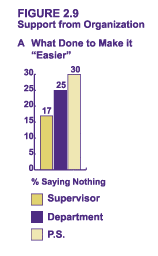 Half
of the respondents said that the formal career development programs offered by
the Public Service (La Rel�ve, AEXDP, CAP, and MTP mentioned most frequently)
had increased the chances that they would achieve their career goals. This
finding is not surprising given how the sample was selected. Virtually all of
the respondents who gave this response were, in fact, currently participating in
a CDP program (76% of those in the CDP sample gave this response versus 2% in
the non CDP sample!) As such, they can be expected to be more aware of the
existence of such programs and familiar with how such programs work.
Half
of the respondents said that the formal career development programs offered by
the Public Service (La Rel�ve, AEXDP, CAP, and MTP mentioned most frequently)
had increased the chances that they would achieve their career goals. This
finding is not surprising given how the sample was selected. Virtually all of
the respondents who gave this response were, in fact, currently participating in
a CDP program (76% of those in the CDP sample gave this response versus 2% in
the non CDP sample!) As such, they can be expected to be more aware of the
existence of such programs and familiar with how such programs work.
Thirty percent of respondents said that the Public Service had done nothing to help their career development. By comparison, 17% of respondents said their supervisor had done "nothing", while 25% said their department had not supported them (see Figure 2.9). These data suggest that respondents are more likely to attribute support to their manager or their department than to the Public Service itself.
Other career supports mentioned in conjunction with the Public Service (see
Table 2.18) mirror the supports reported earlier in our discussion of services
offered by managers and departments. 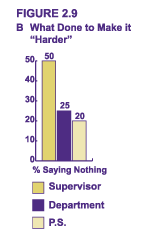 Respondents think the Public Service makes it easier for employees to meet
career goals when it supports education and training, makes it easier for
employees to increase their breadth of knowledge (i.e. encourages
cross-functional/cross-departmental contacts, encourages movement between jobs,
departments), focuses on people skills and people management, and keeps
employees posted on trends and opportunities.
Respondents think the Public Service makes it easier for employees to meet
career goals when it supports education and training, makes it easier for
employees to increase their breadth of knowledge (i.e. encourages
cross-functional/cross-departmental contacts, encourages movement between jobs,
departments), focuses on people skills and people management, and keeps
employees posted on trends and opportunities.
Hinders
What barriers to career advancement do respondents associate with the Public Service itself ? Only 20% of the sample could not identify any barriers. Two of the Public Service obstacles to career advancement are ones we have seen before in association with the manager and the department:
-
no focus on people (people skills are not emphasized, Public Service does not support employees, Public Service devalues employees, pay too low, ageism); and
-
does nothing to enhance employee breadth (structural barriers, too large, traditional, hierarchical, no lateral movement).
Two of the impediments are, however, unique to the Public Service:
-
poor HR practices (classification systems, hiring, recruitment, competition process, problems with HR programs, acting positions); and
-
recent downsizing initiatives (downsizing has reduced opportunities - there is nowhere TO advance to).
There were a number of interesting between-group differences in these findings.
Gender
Women were more likely to say that the formal CDPs offered by the Public Service had helped them meet their career goals. Women were also more likely to indicate that the Public Service had done nothing to help them meet their career goals and that downsizing had reduced opportunities (13% of women gave this response versus 3% of men).
Job Type
The perception of Public Service support for career development varies by job type (see Box 2.8). Examination of these data suggests that executives have the most positive view of the Public Service, scientists the least. Almost half of the employees in the scientist sample (42%) say that the Public Service has done nothing to support their career development; 41% in this sample say that the Public Service has made it harder by not focusing on people, and 35% say that the Public Service has made it harder by downsizing and reducing the opportunities available to them.
|
* Responses cited by more than 20% of the sample |
|
|
Executives |
|
|---|---|
|
Managers |
|
|
Officers |
|
|
Analysts |
|
|
Scientists |
|
Participation in CDP
The perception of Public Service support for career development varies by CDP (see Box 2.9). Those in the AEXDP program had the most positive view of Public Service support (90% of those in the AEXDP sample said the Public Service had helped by providing formal career development programs; 0% in this sample felt the Public Service had done nothing). Employees who did not participate in CDPs were less positive about Public Service support. Almost 40% of the employees in this group said the Public Service had done nothing to support their careers. Respondents who were not in CDPs were also more likely to say that downsizing in the government had reduced opportunities (27% of non CDP employees gave this response versus 4% of those in a CDP).
|
* Responses cited by more than 20% of the sample |
|
|
Not in CDP |
|
|---|---|
|
AEXDP |
|
|
ADM Pool |
|
|
CAP |
|
|
MTP |
|
7. Satisfaction with Career Progress
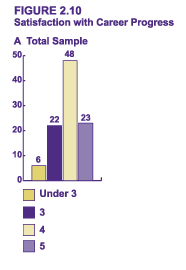 To quantify satisfaction we asked respondents:
To quantify satisfaction we asked respondents:
- How satisfied are you with your ability to meet your career goals? Why do you say this?
When answering this question we asked respondents to use a "1" if they were very dissatisfied with their career progress and a "5" if they were very satisfied.
Ratings are shown in Figure 2.10 and discussed below.
How satisfied are you with your ability to meet your career goals?
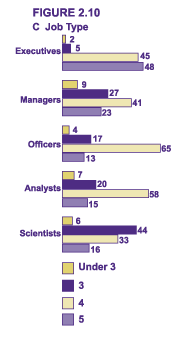
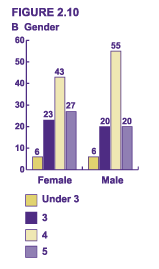 The
data indicate that the majority of those who participated in the interview study
were either satisfied (48% of the sample) or very satisfied (23%) with their
ability to meet their career goals.
The
data indicate that the majority of those who participated in the interview study
were either satisfied (48% of the sample) or very satisfied (23%) with their
ability to meet their career goals.
Gender
Women were more likely than men to be "very satisfied" (see Figure 2.10b).
Job Type
Respondents in the executive sample were the most likely to be very satisfied with their career progress (see Figure 2.10c). Respondents in the scientist groups, followed closely by those in the manager sample, were the least satisfied with their ability to meet their career goals. Those in the officer and analyst samples fall in between the executive and scientist/ manager groups with respect to their level of satisfaction with their ability to meet career goals.
Is there anything the Public Service does that affects your ability to reach your career goals?
|
Participation in CDP
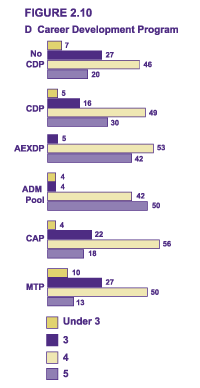 Data
in Figure 2.10d indicate that there is a relationship between participation in a
CDP and satisfaction with career progress. People in CDPs are more likely to be
very satisfied with their career progress; those not in programs are more likely
to be neutral. There are also significant between-program differences.
Respondents in the AEXDP and ADM pools were more likely to be very satisfied
with their ability to meet their career goals; those in the CAP and MTP programs
were more likely to be neutral; respondents who were in the MTP were more likely
to be dissatisfied with their career progress.
Data
in Figure 2.10d indicate that there is a relationship between participation in a
CDP and satisfaction with career progress. People in CDPs are more likely to be
very satisfied with their career progress; those not in programs are more likely
to be neutral. There are also significant between-program differences.
Respondents in the AEXDP and ADM pools were more likely to be very satisfied
with their ability to meet their career goals; those in the CAP and MTP programs
were more likely to be neutral; respondents who were in the MTP were more likely
to be dissatisfied with their career progress.
Why do you say this?
Respondents gave a number of reasons why they were satisfied and one reason for being dissatisfied with their career progress. Not surprisingly, there is a high degree of correspondence between the reasons people gave for being satisfied with their ability to meet their career goals (Table 2.20) and their definitions of career success (see Table 2.11). What gives respondents satisfaction?
-
making visible progress (i.e. increased responsibility over time, I've continually moved closer to my goals, logical succession up the ranks, my jobs have "built on one another");
-
feeling like they have accomplished something (personal sense of accomplishment, reward, something that meets my personal needs, jives with my view of myself as a person, others recognize I do my job well, I've been promoted recently, selected for a special program, etc.);
-
getting the position they have aspired to (i.e. I'm where I want to be, I've proven that I can meet my goals by getting this job);
-
the kind of work they do (I'm happy with the work, happy in my job, I like to come to work in the morning, something I enjoy); and
-
the fact that they were learning something (gaining breadth, jobs have stretched me, I'm working to full potential, enhancing my capabilities, my work challenges me, there is always something new).
Respondents gave only one reason for being dissatisfied with their career progress: the fact they felt it was out of their control (doesn't matter how hard you work, there's always some "externality", it's who you know, pay/hiring freeze reduced my opportunities, etc.).
|
* Multiple responses recorded |
|
|
Why Satisfied with Career Progress |
Total |
|---|---|
|
Satisfied because I am making visible progress |
21% |
|
Satisfied because of sense of accomplishment |
17% |
|
Satisfied because of the position I hold |
16% |
|
Satisfied because of the nature of the work |
13% |
|
Satisfied because I'm learning |
11% |
|
Why Dissatisfied with Career Progress |
|
|
Dissatisfied because it's out of my control |
20% |
Gender
Men are more likely than women to be satisfied because they like the nature of their job (21% versus 8%) or because they are making visible progress (25% versus 18%). Women are more likely than men to be satisfied because they have a sense of achievement (21% versus 12%).
Job Type
There are a number of interesting job type differences in the data:
-
executives were more likely to be satisfied because they are making visible progress (33%), because of the position they hold (28%) and because of the nature of their work (23%). Virtually no one in this group was dissatisfied because they felt their career progress was out of their control (cited by only 2% of executives);
-
one-third of the managers in the sample and 36% of the scientists were dissatisfied with their career progress because they felt it was out of their control;
-
only 2% of officers and 4% of analysts said that they were satisfied because of the nature of their work (versus 14% of the total sample); and
-
scientists were more likely to be satisfied because of the nature of their work (25% of scientists give this response).
How satisfied are you with your career progress?
|
Participation in CDP
Satisfaction with career progress is strongly associated with participation in a CDP:
-
none of the respondents in the AEXDP sample indicated they were satisfied because they were learning (0%) or because of the nature of their work (4%);
-
those in the ADM pool were more likely to be satisfied because they were making visible progress (40%) because of the nature of their work (36%) and because of the position they held (32%). This group was less likely to say they were dissatisfied because their career progress was out of their control;
-
CAP were more likely to be satisfied because their career had given them recognition and a sense of accomplishment (41%) but less likely to be satisfied because of their position (7%) or the nature of their work (3%). One-quarter of CAP were dissatisfied because they felt the ability to progress in their career was outside their control; and
-
MTPs were more likely to be satisfied because they felt they were making visible progress (31%) and because they were learning (28%). Only 6% of the MTP group was satisfied because of the recognition they had achieved, only 7% were satisfied because of the position they had attained and only 3% were satisfied due to the nature of their work. One-quarter of MTPs were dissatisfied with their ability to progress in their career because they felt it was outside their control.
